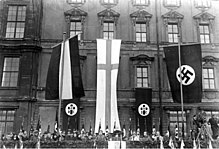Joachim Hossenfelder
Joachim Hossenfelder (born April 29, 1899 in Cottbus , † June 28, 1976 in Lübeck ) was a German Protestant theologian and clergyman.
Life
During his studies he became a member of the Association of German Students in Breslau . Hossenfelder came into contact with National Socialism early on. He was a participant in battles of the Freikorps in Silesia . On April 1, 1929, he became a member of the NSDAP .
Since 1923 a Protestant country pastor in Alt Reichenau in Silesia, he became pastor at the Christ Church in Berlin in 1931. In 1932 he was a co-founder of the anti-Semitic religious movement German Christians and became its first Reichsleiter. He understood the German Christians as "the SA of Jesus Christ".
On September 6, 1933 he became "Bishop of Brandenburg ", clergyman vice-president of the Old Prussian Evangelical Upper Church Council and a member of the imperial church government.
In November 1933, after the Sportpalast scandal, there was wing fighting among the German Christians. In December 1933 Hossenfelder was given leave of absence by Reich Bishop Müller and announced his resignation on December 21st.
In 1939 Hossenfelder became pastor at the Potsdam Peace Church . After the end of the Second World War , he was pastor and deaf-mute chaplain in Vehlow from 1947 . From 1954 to 1969 he was pastor in Ratekau for the Evangelical Lutheran Church in Eutin .
Hossenfelder as editor of a Sunday paper
Hossenfelder was the first "leader of the German Christian Faith Movement" (DC) to publish the Sunday paper Evangelium in the Third Reich with the subtitle "Sunday Paper of German Christians" and was active as an author in it. The magazine was published once a week by the Berlin-based publisher “Gesellschaft für Zeitungsdienst” GmbH. When the publishing company got into financial difficulties "because whole areas" had "canceled the subscription to the paper" at the publishing house, the Berlin bankruptcy administrator Theodor Baudach tried to collect an open financial claim from the Reich leadership of the German Christians. In this context, the Reich Bishop Ludwig Müller demanded that the “magazine for the unrestricted disposal of the Reich leadership” should be available to this religious movement; neither the new DC Reichsleiter children "nor Bishop Hossenfelder, nor any other individual" should be the editor in the future. Previously, the managing director of this GmbH , Lawrenz, and the publishing director, Lohmann, of the "Gesellschaft für Zeitungsdienst" had turned to the President of the Evangelical High Church Council, Friedrich Werner , for financial support because of the "economic difficulties" on the grounds that their publisher had published this magazine “As the only paper ever in the service of the German Evangelical Church, he did public relations work without enjoying the aid of any church authorities, as was previously part of the practice of the church towards other public announcement organs.” The Sunday paper also had “no grants from the regional churches Old Prussian Union received ”.
Fonts
- The guidelines of the German Christians. Edited by Joachim Hossenfelder. Berlin 1932, DNB 575825774 .
- Our fight (= series of the "German Christians". Issue 1). M. Grevemeyer, Berlin-Charlottenburg 1933, OCLC 236223312 ; 2nd edition Society for Newspaper Service, Berlin; HG Wallmann, Leipzig 1933, DNB 580237184 .
- People and Church. The official reports of the first Reichstag in 1933 of the “German Christians” movement (= series of the “German Christians”. Issue 4). Berlin, 1933, OCLC 316205354 (proceedings); 2nd and 3rd editions Grevemeyer, Berlin-Charlottenburg 1933.
literature
- Ernst Klee : The dictionary of persons on the Third Reich . Who was what before and after 1945. Fischer-Taschenbuch-Verlag, Frankfurt 2003, ISBN 3-10-039309-0 ; update Edition, 2nd edition 2007, ISBN 978-3-596-16048-8 .
- Hansjörg Buss: The " Kieckbusch Era " (1930–1976): The Eutin Regional Church and the German Christians. In: Information on Schleswig-Holstein Contemporary History (ISHZ). Edited by the working group for research into National Socialism in Schleswig-Holstein eV (AKENS), Kiel. Vol. 44 (2004), OCLC 637122097 , pp. 4-29.
- Klaus Scholder : The churches and the Third Reich. Volume 1: Prehistory and Time of Illusion 1918–1934. Econ-Ullstein-List, Munich 2000, ISBN 3-612-26730-2 .
- Joachim G. Vehse: Life and work of the first Reichsleiter of the German Christians, Joachim Hossenfelder. In: Writings of the Association for Schleswig-Holstein Church History. 2nd row: Articles and communications, Volume 38. Karl Wachholtz, Neumünster 1982, ISSN 0342-2097 , pp. 73–123.
Web links
- Literature by and about Joachim Hossenfelder in the catalog of the German National Library
Individual evidence
- ↑ Louis Lange (Ed.): Kyffhäuser Association of German Student Associations. Address book 1931. Bernard & Graefe, Berlin 1931, DNB 012645753 , p. 97.
- ^ Quotation from Ernst Klee : Das Personenlexikon zum Third Reich. Who was what before and after 1945 (= Fischer pocket books. The time of National Socialism. Bd. 16048). Update Edition Fischer-Taschenbuch-Verlag, Frankfurt am Main 2005, p. 271, pronouncement 1933.
- ^ Ernst Klee: The dictionary of persons on the Third Reich. 2005, p. 271.
- ↑ Hafenplatz 5 . In: Berliner Adreßbuch , 1935, Part IV, p. 325. “Gesellsch. f. Zeitungsdienst GmbH ”(Kreuzberg administrative district; Reichsnährstand building ; accessed on July 12, 2016).
- ^ Baudach, Theodor, bankruptcy administrator . In: Berliner Adreßbuch , 1935, Part I, p. 101 (Berlin-Oberschöneweide; accessed on July 12, 2016).
- ^ Evangelisches Zentralarchiv Berlin: Sunday paper "Evangelium in the Third Reich" and bankruptcy of the "Society for Newspaper Service". File: EZA 1/1267, accessed on July 12, 2016.
| personal data | |
|---|---|
| SURNAME | Hossenfelder, Joachim |
| ALTERNATIVE NAMES | Hossenfelder, Joachim Gustav Wilhelm |
| BRIEF DESCRIPTION | German Protestant theologian and clergyman |
| DATE OF BIRTH | April 29, 1899 |
| PLACE OF BIRTH | cottbus |
| DATE OF DEATH | June 28, 1976 |
| Place of death | Lübeck |
